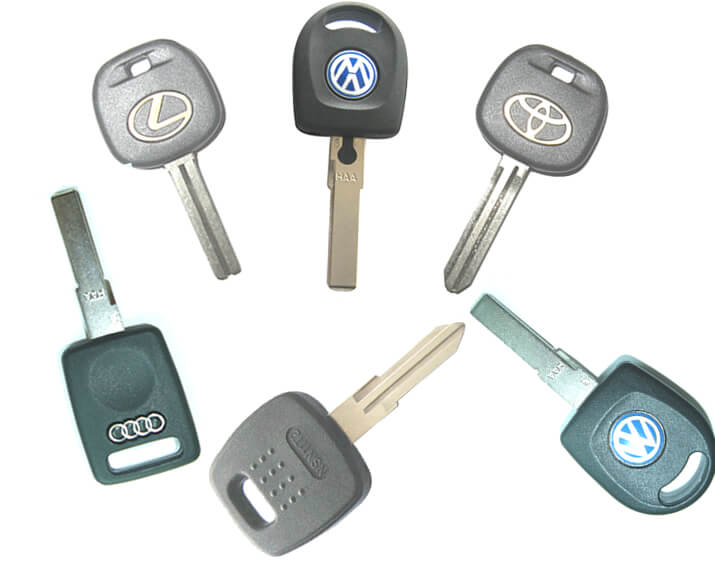Transponder Keys Explained: Everything You Need to Know 🔑🚗
Car security has come a long way from simple metal blades. Today, most vehicles use transponder keys—embedded microchips that communicate with your car’s immobilizer system. If you’ve ever wondered what makes these keys so secure, how they work, or how much it costs to replace and program one in Orlando, you’re in the right place. We’ll walk through everything from the basics of transponder keys to when you should call a professional. By the end, you’ll understand why transponder keys are standard issue for nearly every modern vehicle and how Good Deal Locksmith can help you with all your transponder key needs.
What Is a Transponder Key? 🔍
A transponder key looks like a traditional car key from the outside—metal blade, plastic head. What sets it apart is a tiny radio-frequency identification (RFID) chip embedded inside the plastic head. When you insert the key into the ignition, the car’s onboard computer sends a coded signal to the chip. If the chip returns the correct code, the computer allows the engine to start; if it doesn’t, the engine stays immobilized.
-
Key Components:
-
Metal Blade: Physically turns the ignition lock.
-
RFID Chip (Transponder): Communicates wirelessly with the vehicle.
-
Code Pairing: Each chip has a unique digital code that matches the car’s immobilizer.
-
Over the last twenty years, automakers have adopted transponder keys to combat theft. In the days of purely mechanical keys, hot-wiring or lock-picking could start many vehicles. With transponders, however, stealing a car requires not only a matching key blade but also the correct electronic code, making unauthorized ignition nearly impossible.
How Transponders Communicate with Your Car 📡
At its core, this process is a simple “challenge–response” exchange between the key’s chip and the car’s immobilizer unit:
-
Ignition Activation: When you insert the key and turn to the “ON” position, the car’s immobilizer module sends a short-range RF signal (often around 125 kHz) to the transponder chip.
-
Chip Response: The RFID chip in the key head is passive—it does not have its own power source. Instead, it uses energy from the car’s signal to power up. Once energized, it broadcasts back a unique digital code (usually a 64- or 96-bit number) via backscatter modulation.
-
Verification: The immobilizer compares the returned code with its stored database. If the code matches one of the programmed keys (usually saved in the car’s ECU), the immobilizer deactivates and allows current to flow to the starter motor.
-
Engine Start: With the immobilizer satisfied, the engine control unit (ECU) engages the starter and ignition system, permitting the car to start.
Any mismatch—due to a faulty chip, a non-programmed key, or interference—causes the immobilizer to remain engaged, cutting off fuel injection or ignition spark. This effectively stops the engine from turning over or immediately kills spark to prevent running.
Advantages of Transponder Keys ✅
Transponder keys have become the industry standard for good reason. Here are three major benefits that illustrate why they remain popular today:
-
Enhanced Theft Prevention
-
Immobilizer Protection: Even if a thief manages to cut a duplicate blade, they cannot start the vehicle without the correct chip code.
-
Deter Break-Ins: Cars equipped with transponder keys often feature visible stickers warning of immobilizer systems—thieves know to move on to easier targets.
-
-
Reliability and Durability
-
Fewer Mechanical Failures: Because the electronic communication handles most of the security, the metal blade tends to wear less quickly than older purely mechanical locks.
-
Low Maintenance: No need to replace internal wafer tumblers as frequently; a simple recut of the blade and reprogramming of a new chip can restore full function.
-
-
Convenience Features (on Some Models)
-
Keyless Entry & Push-Button Start: Many modern cars combine the transponder chip with a proximity fob, allowing drivers to walk up and start the engine without physically inserting a key.
-
Integrated Remote Control: Some transponders also incorporate remote lock/unlock buttons, trunk release, and panic alarms—providing a compact, all-in-one device.
-
Overall, these advantages translate into peace of mind for vehicle owners. While a traditional key relies solely on mechanical alignment, a transponder key’s digital handshake makes unauthorized starts nearly impossible without specialized equipment.
Cost of Replacement and Programming in Orlando 💸
Replacing a transponder key involves both cutting a new metal blade and programming the chip to match your vehicle’s immobilizer. In the Orlando area, costs can vary depending on your vehicle’s make, model, and year. Here’s a general breakdown:
-
Basic Transponder Key (Older Domestic Models)
-
Key Blank Cost: $10–$25
-
Cutting Fee: $10–$20
-
Programming Labor: $40–$60
-
Total Average Cost: $60–$105
-
-
High-End or Imported Vehicles (European, Luxury Brands)
-
Key Blank Cost: $50–$150 (often higher for specialized key housing)
-
Cutting Fee: $20–$40
-
Programming Labor: $80–$150
-
Total Average Cost: $150–$340
-
-
Proximity Smart Keys (Push-Button Start Systems)
-
Key Fob Blank Cost: $100–$250
-
Cutting & Transponder Programming: $60–$120
-
Remote Functions (Lock/Unlock/Trunk/Panic) Setup: $40–$80
-
Total Average Cost: $200–$450+
-
Cost Factors to Consider:
-
Dealer vs. Locksmith: Dealership pricing tends to be higher—an extra $50–$100 premium for labor and OEM parts. A reputable local car locksmith like Good Deal Locksmith offers comparable quality at lower rates.
-
Complexity of Programming: Some luxury vehicles require manufacturer scan tools and special security codes—this can increase labor time.
-
Emergency or After-Hours Service: If you need a mobile locksmith to come to your location outside business hours, expect a $20–$50 call-out surcharge.
Tip: Always confirm whether your locksmith’s quote includes the blank, cutting, and all programming fees. Some quotes appear low initially but add hidden costs for programming or remote pairing.
DIY vs. Professional Transponder Key Services 🏡🔧
When your transponder key goes missing or malfunctions, you have two primary options: attempt a DIY solution or hire a professional. Below is a comparison to help you decide which is right for your situation.
DIY Transponder Key Services
-
Pros:
-
Lower Upfront Cost: Purchasing a generic transponder kit online (approx. $30–$70) can be cheaper in materials.
-
Satisfaction of Self-Help: If you enjoy hands-on tasks, programming a simple key with online tutorials can be rewarding.
-
-
Cons:
-
Risk of Errors: A single misstep—wrong code entry or incomplete programming—can lock the ECU, requiring a professional reset at additional cost.
-
Compatibility Issues: Generic kits may claim compatibility with hundreds of models but often lack brand-specific firmware updates, leading to failed programming attempts.
-
Limited Customer Support: If the programming fails, many online sellers offer minimal guidance—leaving you stranded with an unprogrammed key.
-
Professional Transponder Key Services
-
Pros:
-
Guaranteed Programming: A certified locksmith uses dealer-grade scan tools or high-end aftermarket diagnostic devices, ensuring accurate code matching on the first try.
-
No Towing Required: Mobile locksmiths come to your location, saving you tow fees and immediate inconvenience.
-
Warranty and Support: Reputable locksmiths often provide a limited warranty on both parts and labor, giving you peace of mind if the key malfunctions later.
-
-
Cons:
-
Higher Cost than DIY Kits: Professional services typically run $60–$150 per key depending on the vehicle.
-
Appointment or Wait Time: You may need to wait for an available technician, especially during peak demand periods (holiday travel seasons).
-
Recommendation: If you have an older vehicle with straightforward programming (e.g., 1998–2004 domestic brands), a DIY kit might work if you’re confident and have basic tools. However, for anything newer—especially vehicles with rolling-code security or integrated proximity systems—opt for a professional locksmith to avoid costly errors.
How Good Deal Locksmith Can Assist You 🛠️🔑
At Good Deal Locksmith, we specialize in transponder key replacement and programming throughout the Orlando area. Here’s how we make the process simple, fast, and cost-effective:
-
Mobile On-Site Service:
-
Our technicians come directly to your home, office, or roadside location. No towing needed—save time and money.
-
-
Wide Vehicle Coverage:
-
Domestic, import, luxury, and hybrid models—whether it’s a 2005 Ford F-150, a 2018 Toyota Camry, a 2019 BMW 3 Series, or a 2020 Lexus RX, we have the right key blanks and diagnostic tools.
-
-
Dealer-Grade Diagnostic Equipment:
-
We use factory-level scan tools and specialized transponder programmers that match or exceed OEM standards. This ensures accurate, one-pass programming without ECU lockouts.
-
-
Transparent, Upfront Pricing:
-
Before any work begins, we provide a detailed quote that includes the cost of the blank key, cutting, programming labor, and any remote fob pairing. No hidden fees—ever.
-
-
Limited Warranty on Parts & Labor:
-
All transponder keys and fobs we supply come with a 90-day warranty against manufacturing defects. If your newly programmed key fails within that period, we’ll reprogram or replace it at no extra charge (conditions apply).
-
-
Additional Services:
-
Broken Key Extraction: If your old transponder key breaks in the ignition or door lock, we extract it safely without damage.
-
Key Duplication & Spares: We can cut and program multiple spares at once—ideal for families or fleet vehicles.
-
Remote Fob Repair: If your fob’s buttons wear out, we can replace the housing, battery, and internal electronics while preserving the original transponder code.
-
Client Example: Last week, a customer’s Honda Civic key fob stopped unlocking the doors, and the spare key was missing. We arrived within 30 minutes, extracted the broken key from the ignition, cut a new transponder blade, and programmed two new fobs—all for under $120. She was back on the road before lunchtime.
Conclusion & Call-to-Action 📞🏁
Understanding transponder keys explained gives you insight into why modern vehicles rely on embedded chips for security—and why DIY attempts can be risky. If you ever lose your key, break it off, or need a spare, trust Good Deal Locksmith in Orlando for prompt, reliable service. With mobile technicians, dealer-grade equipment, and transparent pricing, we’ll restore your mobility without the dealership markup.
🔑 Ready for a new transponder key? Visit our Automotive Key Replacement page or call us at (407) 726-8486 to schedule on-site programming. Keep your car secure and your mind at ease—contact Good Deal Locksmith today!

